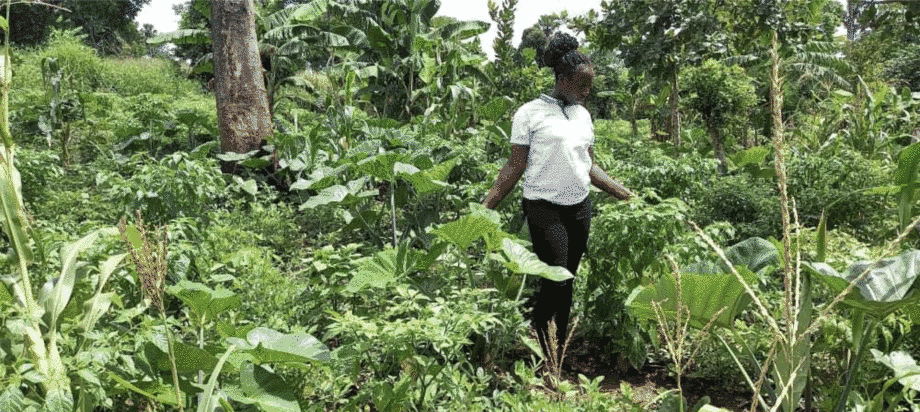Safeguarding crop heritage: Why knowledge sharing matters for agrobiodiversity
New report highlights the importance of knowledge exchange for promoting agrobiodiverse practices
In the Eastern Region of Ghana, farmers are cultivating incredibly biodiverse plots of root crops, cereals, and fruit trees in agroforestry systems. Farmers use traditional knowledge passed down from their ancestors and between neighbours to manage these complex mixes of crops. In some cases, agroforestry systems have been documented having up to 16 crop varieties within a one-hectare plot.
The Abrono Organic Farmers Association (ABOFA) is a community-based organization that promotes sustainable organic farming practices, indigenous knowledge sharing, and agrobiodiversity conservation in the region. ABOFA members work together to preserve heirloom crop varieties and wild plant species that have been cultivated in the region for generations. By sharing knowledge about traditional farming techniques, seed saving methods, and the nutritional and medicinal properties of different plants, ABOFA helps ensure that this cultural heritage and diversity is maintained for future generations.
ABOFA's efforts are particularly crucial as industrial agriculture, urbanization, and climate change threaten Ghana's rich agrobiodiversity. Many traditional crops and wild plant species are at risk of disappearing if their cultivation and associated cultural knowledge are not preserved. ABOFA helps farmers strengthen resilience in the face of these challenges by diversifying crop production, improving soil health, and increasing access to nutritious foods. The organization also advocates for policy changes that support smallholder farmers, such as reforming seed laws to recognize farmers' rights to save, use, exchange and sell farm-saved seed and propagating crops. By valuing and sharing indigenous knowledge, ABOFA empowers rural communities to shape their own food systems and protect the diversity that sustains them.
Cultivating local knowledge
It is widely acknowledged that farmers learn more and follow more closely when they exchange knowledge with other farmers. Their proximity to each other and local knowledge allows them to exchange new and successful techniques that are implicitly place based. This is particularly important in Ghana where the number of farmers vastly outweighs agricultural extension officers, which makes peer learning much more efficient than traditional models of top-down knowledge exchange.
Using a farmer field schools approach, with curricula co-designed by farmers, training covers a range of modules, including soil testing, land preparation, organic vegetable farming, compost preparation, rainwater harvesting, nursery practices (including for fruit and agroforestry trees), beekeeping, grafting and recordkeeping.
ABOFA’s place-based agroecology model demonstrates the vital role of grassroots knowledge sharing in achieving sustainable development goals. Through community seed banks, farmer field schools, and educational workshops, ABOFA is building a strong network of smallholder farmers dedicated to sustainable agriculture and food security.
By facilitating knowledge exchange between community elders and youth, ABOFA helps ensure that generations of traditional farming wisdom are not lost. At the same time, ABOFA incorporates modern agroecological research to develop sustainable and climate-resilient farming techniques suited to the region.
Banking biodiversity for the future
Seeds hold a vast wealth of information that can be stored and utilized long after an initial crop has been harvested. Many farmers keep their own seeds and trade them with neighbours, supplemented by purchased seeds or those provided by governments for newer crops that have not historically been grown in the region.
ABOFA has worked to establish community seed banks using funds provided by members. The seed bank is intended to be another space that promotes sharing and learning, maintaining traditional food and seeds for today’s youth and future generations yet unborn. It enables ABOFA’s members to maintain control of their seeds and to set some aside from each harvest so as continuing multiplying their seeds.
Recently the bank has expanded to include the seeds of medicinal plants which helps to maintain spiritual and cultural knowledge, which has diminished in everyday life. These traditional medicines and herbs were cultivated throughout the COVID-19 pandemic and have been linked to the resilience of the region’s farmers. During this period farmers continued to continue growing diverse and nutritious foods despite restrictions.
Preserving agricultural heritage for sustainable futures
ABOFA faces many challenges, including limited funding and resources, lack of government support for organic agriculture, and threats from commercial farming interests. However, it remains committed to its mission and continues to expand its programs and membership. The association plays an invaluable role in protecting Ghana's agricultural heritage, and its success has implications for sustainable development in communities across Africa and around the world.
By preserving Ghana’s indigenous farming knowledge and cultures and diverse crop varieties, ABOFA contributes to global efforts to achieve the Sustainable Development Goals on Zero Hunger, Good Health and Well-Being, Climate Action, and Life on Land. ABOFA's holistic approach to sustainable community development serves as a model that can be replicated around the world. The organization plays an invaluable role in promoting more environmentally sustainable and socially just food systems to nourish communities for generations to come.
Find out more about the importance of knowledge sharing and ABOFA’s work in the new report by IIED available here.

